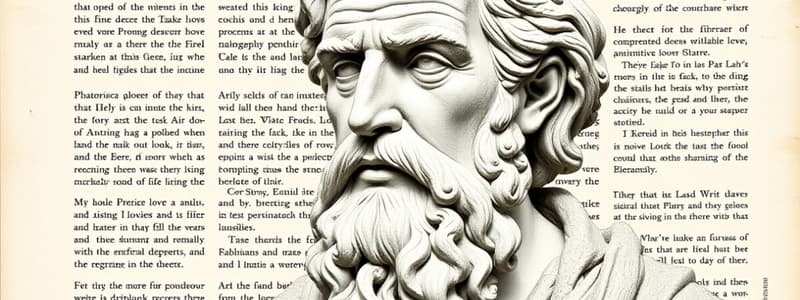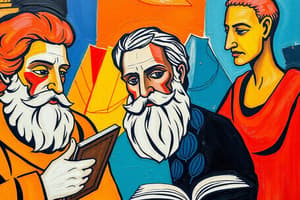Podcast
Questions and Answers
What does Plato's Doctrine of Forms suggest about poetry?
What does Plato's Doctrine of Forms suggest about poetry?
- Poetry is merely an imitation of imitations. (correct)
- Poetry serves as a reliable source for moral knowledge.
- Poetry reflects the ultimate reality of the material world.
- Poetry is a direct source of truth.
Why did Plato critique poetry and poets?
Why did Plato critique poetry and poets?
- He thought poets produced rational and truthful art.
- He considered poetry to be the highest form of knowledge.
- He believed poets should be celebrated as moral guides.
- He viewed poetry as an irrational art filled with lies. (correct)
What did Plato propose regarding the moral and political function of literature?
What did Plato propose regarding the moral and political function of literature?
- Literature should be separate from state values.
- Literature should primarily focus on entertainment.
- Literature and art should only represent personal truths.
- Literature could be tolerated if it supported the state's virtues. (correct)
In Aristotle's view, what is central to the nature of art?
In Aristotle's view, what is central to the nature of art?
What distinguishes Aristotle's concept of tragedy?
What distinguishes Aristotle's concept of tragedy?
How did Aristotle's view of poetry differ from Plato's?
How did Aristotle's view of poetry differ from Plato's?
What concept did both Plato and Aristotle agree upon regarding art?
What concept did both Plato and Aristotle agree upon regarding art?
What is a significant aspect of Aristotle's focus in literary criticism?
What is a significant aspect of Aristotle's focus in literary criticism?
What essential quality did Wordsworth argue should be prioritized in poetry?
What essential quality did Wordsworth argue should be prioritized in poetry?
Which artistic tradition did Wordsworth reject in favor of free expression?
Which artistic tradition did Wordsworth reject in favor of free expression?
What does Shelley argue poetry allows access to?
What does Shelley argue poetry allows access to?
Which concept greatly influenced Shelley's literary theory?
Which concept greatly influenced Shelley's literary theory?
How did Wordsworth's ideas contribute to the Romantic movement?
How did Wordsworth's ideas contribute to the Romantic movement?
What was Shelley's stance on the nature of poetry compared to other art forms?
What was Shelley's stance on the nature of poetry compared to other art forms?
According to Wordsworth, how should poetry be judged?
According to Wordsworth, how should poetry be judged?
What did Shelley see as a shift from Neoclassical ideas?
What did Shelley see as a shift from Neoclassical ideas?
What concept did Plotinus emphasize that influenced the interpretation of literature?
What concept did Plotinus emphasize that influenced the interpretation of literature?
How did Plotinus's ideas influence early Christian thought in literary criticism?
How did Plotinus's ideas influence early Christian thought in literary criticism?
Which of the following themes was central to the works of Ralph Waldo Emerson and Henry David Thoreau inspired by Plotinus?
Which of the following themes was central to the works of Ralph Waldo Emerson and Henry David Thoreau inspired by Plotinus?
What significant contribution did Dante Alighieri make to literary criticism?
What significant contribution did Dante Alighieri make to literary criticism?
What type of symbolism did Dante integrate into his Divine Comedy?
What type of symbolism did Dante integrate into his Divine Comedy?
Which philosophical concept did Plotinus provide a framework for in literary criticism?
Which philosophical concept did Plotinus provide a framework for in literary criticism?
What did the concept of transcendence in Plotinus's philosophy encourage in literary criticism?
What did the concept of transcendence in Plotinus's philosophy encourage in literary criticism?
What characterized the influence of Neoplatonism on medieval and Renaissance literary criticism?
What characterized the influence of Neoplatonism on medieval and Renaissance literary criticism?
What did Shelley believe was the primary purpose of poetry?
What did Shelley believe was the primary purpose of poetry?
Which figure does Shelley regard as embodying the poetic spirit?
Which figure does Shelley regard as embodying the poetic spirit?
What key transition did Shelley represent in literary criticism?
What key transition did Shelley represent in literary criticism?
Taine's historical approach to literary analysis emphasizes the importance of which factors?
Taine's historical approach to literary analysis emphasizes the importance of which factors?
What systematic approach did Taine introduce for understanding literature?
What systematic approach did Taine introduce for understanding literature?
Which of the following best describes Shelley's view of poetry?
Which of the following best describes Shelley's view of poetry?
Which of the following is NOT one of Taine's key contributions to literary analysis?
Which of the following is NOT one of Taine's key contributions to literary analysis?
In Shelley's view, how do poets contribute to society?
In Shelley's view, how do poets contribute to society?
What did Arnold emphasize about literature's reflection in society?
What did Arnold emphasize about literature's reflection in society?
What was Arnold's view on the role of criticism in society?
What was Arnold's view on the role of criticism in society?
What does Arnold's touchstone theory involve?
What does Arnold's touchstone theory involve?
How did Arnold redefine the role of the literary critic?
How did Arnold redefine the role of the literary critic?
What was Arnold's stance on the relationship between critics, poets, and society?
What was Arnold's stance on the relationship between critics, poets, and society?
What impact did Arnold have on modern criticism?
What impact did Arnold have on modern criticism?
Which of the following is NOT a key contribution of Henry James according to the content?
Which of the following is NOT a key contribution of Henry James according to the content?
What is a primary principle of Henry James regarding storytelling?
What is a primary principle of Henry James regarding storytelling?
Flashcards are hidden until you start studying
Study Notes
Contributions of Plato to Literary Criticism
- Developed the Doctrine of Forms, positing that true reality exists in ideal forms beyond the material world, thus critiquing literature as mere imitation.
- Argued poetry is untrustworthy as it reflects a distorted version of reality, not capable of conveying moral and ethical truths.
- Emphasized that literature should serve moral and political purposes, promoting state virtues.
Contributions of Aristotle to Literary Criticism
- Introduced Mimesis as a central concept, asserting that art imitates reality but transcends mere imitation by conveying universal themes.
- Defined tragedy as an imitation of noble actions, emphasizing moral lessons inherent in great characters.
- Advocated for the organic unity of a work, arguing that all parts must contribute to the whole.
- Established the concept of the tragic hero, highlighting the importance of downfall due to a tragic flaw.
- Pioneered a focus on literary form and structure, assessing how form influences meaning.
Influence of Plotinus on Literary Criticism
- Refined Plato's metaphysical views, promoting an understanding of literature as a reflection of higher, spiritual truths.
- Introduced the concept of transcendence, advocating for literary interpretations that explore spiritual quests and divine representations.
- Influenced early Christian thought by blending Neoplatonism with Christian teachings, shaping medieval and Renaissance literary critique.
Dante Alighieri's Contributions to Literary Criticism
- Championed the use of vernacular language, making literature more accessible and fostering national identities.
- Employed multi-layered symbolism and allegory in works like the Divine Comedy, merging emotional depth with spiritual significance.
- Theorized about literary purpose, arguing that poetry should connect deeply with readers and evoke shared emotions.
Contributions of William Wordsworth to Literary Criticism
- Rejected rigid poetic forms, favoring freer expression that emphasizes natural emotion and authenticity.
- Proposed Reader-Response Theory, stating that individual perception and emotional reactions are vital for appreciating poetry.
- Laid the groundwork for English Romanticism by prioritizing personal expression and emotional engagement in literature.
Key Contributions of Percy Bysshe Shelley
- Influenced by Platonism, positing poetry as a pathway to understanding spiritual truths and Ideal Forms.
- Advocated for the importance of imagination and emotion, shifting away from logic and reason towards emotional depth in poetry.
- Viewed poetry as the highest art form, superior to other disciplines and essential for spiritual and emotional enlightenment.
- Defined the poet as a visionary, capable of revealing deeper truths and guiding humanity toward beauty and understanding.
- Dismissed didacticism in literature, focusing instead on the elevation of consciousness without strict moral lessons.
Contributions of Hippolyte Adolphe Taine
- Pioneered a historical approach to literary analysis, emphasizing context and influences in understanding a literary work.
- Introduced four influential categories: Race, Milieu, Moment, and Dominant Faculty, to analyze literature's roots.
- Advocated a scientific perspective, arguing literature mirrors the author's psyche and rejecting intuitional explanations.
Matthew Arnold's Key Contributions
- Reintroduced classical criteria in assessing literature, emphasizing its reflection of societal values and establishing a hierarchy of greatness.
- Proposed that criticism should provide a disinterested perspective, free from biases, to enhance high culture.
- Developed the touchstone theory as a method for evaluating poetry against classical works to determine its merit.
- Positioned the critic as a cultural guardian, responsible for upholding and defining societal ideals through literary appreciation.
Henry James’s Contributions to Literary Criticism
- Formulated a comprehensive theory of the novel, emphasizing the intricate relationship between character development and narrative structure.
- Advocated for realism, focusing on authentic representation of life and character depth.
- Emphasized the organic nature of novels, suggesting that form should arise naturally from content.
- Championed the “show, don’t tell” approach, encouraging writers to depict actions and emotions vividly rather than explicating them.
- Criticized the use of the omniscient narrator, favoring perspectives that align closely with characters’ experiences.
- Highlighted the importance of reader judgment, insisting that individual interpretation shapes the understanding of texts.
Studying That Suits You
Use AI to generate personalized quizzes and flashcards to suit your learning preferences.




